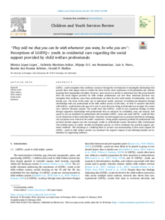Abstract:
LGBTQ+ youth strengthen their resilience resources through the development of meaningful relationships that provide them with unique tools to combat the stress derived from experiences of discrimination and violence targeting their marginalized identities. However, more research is needed to understand how this group benefits from the social support provided by child welfare professionals and how these relational processes may strengthen their resilience, since these professionals are often the only adult models of relationship, even after leaving care.
The focus of this study was to understand youths’ processes of resilience-development through relationships with care professionals in the child welfare system. In this study, the authors held 15 narrative interviews with LGBTQ+ youth between the ages of 14 and 21 years that were living in residential care in Spain.
The authors carried out a reflexive thematic analysis. The results show that LGBTQ+ youth in care experience feelings of safety through supportive relationships with professionals that are enhanced by availability, trust, and honesty. Safe spaces in care are facilitated by professionals who normalize LGBTQ+ issues and make LGBTQ+ youth feel they can be themselves in their residential homes.
Functions of social support such as personal attachment, belonging, and acceptance were evident in the youths’ experiences. Young people expressed gratitude for professionals who provided identity support and who encouraged youths to authentically express themselves fully. Professionals who scaffold agency in youths’ identity development process, as well as emotional and practical support, promoted resilience. This knowledge is a building block to advance our understanding of how social support for LGBTQ+ youth in child welfare systems can counteract the negative impacts of non-affirming families and institutions by augmenting resilience.

